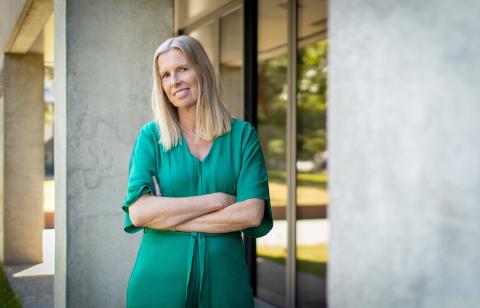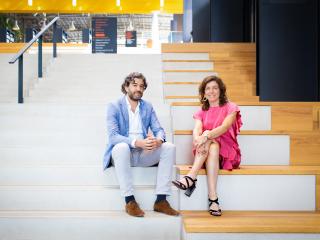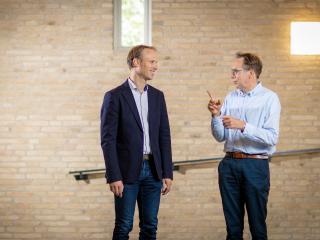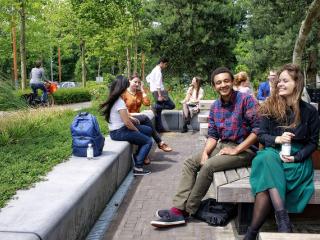We Care provides a platform for collaboration
Tilburg University and the Elisabeth-TweeSteden Hospital (ETZ) have been working together on various research projects for years. For example, within the research project Predict and Recover in the field of cognitive damage after a neurological condition. The ETZ and the university are now broadening their collaboration through the “We Care” program.
‘Interdisciplinary research to improve patient care’
Within the We Care partnership, €500,000 a year is available for research. All five Tilburg University Schools are involved. Professor Jantine Schuit is Dean of the Tilburg School of Social and Behavioral Sciences (TSB). As the School has been working with ETZ for some time now, this School is coordinating the We Care program. “All Schools can compete for research funding on the condition that they collaborate with parties within the ETZ.”

‘Our researchers look at issues from different perspectives: legal, social, psychological, and economic.’
- Jantine Schuit
Improve patient care
“We have a leading clinical hospital in our backyard; you have to do something with that,” says Schuit. “The primary goal of We Care is to improve patient care. It is also a great opportunity for Tilburg University to demonstrate the added value of our research for developing good care. The different perspectives from our disciplines make us a very suitable research partner for hospitals.” Professor Bart Berden, chair of the ETZ Executive Board, is also enthusiastic about pooling expertise. “Tilburg University has an eye for social themes within health care and health. The fact that it doesn't have a medical School actually creates opportunities.”
‘There is a person behind the care we provide’.
- Bart Berden

Multiple perspectives
Why We Care? Berden: “Think of it as a platform that increases the chance of collaboration. We had a couple of sessions to talk about ideas. That's where medical practitioners and scientists found each other. Actually, it's a form of match making.” Schuit: “Within We Care, the university does research together with physician. In addition, we encourage looking at a research question from an interdisciplinary perspective. An issue often has multiple angles such as legal, social, psychological, and economic. The expectation is that interdisciplinary research will lead to greater impact. The way in which research is carried out differs from one discipline to another. Researchers from Tilburg law School, for example, are studying 'Is this allowed?' and are developing legal frameworks, while researchers from TSB are more likely to study ‘Does this work?’ and make use of empirical research. By looking across borders and learning from each other, you come to new insights.”
Shared decision-making
We Care focuses on two themes: shared decision-making and data science. Berden: “This first theme is about quality of life. You can look at the hard parameters, such as risk of complications and survival when choosing a treatment, but there are more aspects that are relevant. There is a person behind the care we provide. Take, for example, the choice not to treat. It sounds simpler than it is. The patient expects action and the physician is trained to act. At the same time, it is important that you inform a patient well. It turns out that one third of the patients have insufficient decision-making ability. For example, if someone does not know what percentages are and what they mean, then you should explain this. We do this, for example, by visualizing it: ten out of a hundred dolls are red, ninety are green.”
Data science
The second theme is data science. Why? Schuit: “On the one hand, it is a current development in which we want to participate in health care and as a university. Secondly, it is a different way of doing research and we can use it to develop new methods of treatment and study their effectiveness. That is very interesting. New treatments are only now being introduced after years of research in which the treatment or medicine is tested, first on animals and later on humans. Many of these studies are based on research on middle-aged men. “Data changes and enriches continuously,” adds Berden.
“But it has to be converted into meaningful information. To do this, you have to collect and analyze data.”
Awarding grants
The financing of We Care is fifty fifty: ETZ pays €250,000 per year, and Tilburg University does the same. Schuit: “The first assessment round has now been completed and a number of applications have been selected to write a more detailed grant [MB1] application. We then proceed to awarding the grants. This is done by a committee in which three Vice-Deans and two representatives from the ETZ participate.” With these grants, We Care intends to encourage collaboration between physicians and researchers, which will later be continued with its own funding or with funding obtained in some other way.
On your own feet
Berden hopes that it will be possible in the future to have a number of research lines within We Care that can stand on their own two feet with the help of European or other subsidies. “We Care awakens a lot of enthusiasm. The ETZ is a place of care, research, and knowledge transfer. Collaboration in research brings the hospital to fruition.” Schuit: “We Care is becoming a kind of testing ground for interdisciplinary research. The idea is that the research is carried out in a sustainable manner.”








